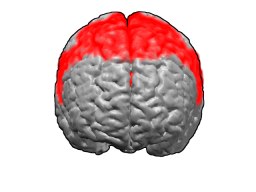Brodmann areas 3, 1 and 2
Brodmann areas 3, 1, and 2 are regions of the cerebral cortex in the human brain that are involved in somatosensory processing. These areas were first defined by Korbinian Brodmann based on their cytoarchitectonic characteristics. They are located in the postcentral gyrus, and are part of the primary somatosensory cortex (S1).
Brodmann area 3[edit | edit source]
Brodmann area 3 is the main receptive sensory area for the sense of touch. It receives a substantial amount of input from the thalamus, and is involved in the processing of tactile information. This area is also responsible for the perception of pressure and texture.
Brodmann area 1[edit | edit source]
Brodmann area 1 is involved in the processing of tactile information, specifically texture and size. It receives input from the thalamus and sends output to the secondary somatosensory cortex (S2).
Brodmann area 2[edit | edit source]
Brodmann area 2 is involved in the processing of proprioceptive information, which is information about the position and movement of the body. It receives input from the thalamus and sends output to the premotor cortex and the supplementary motor area.
See also[edit | edit source]
References[edit | edit source]
Search WikiMD
Ad.Tired of being Overweight? Try W8MD's physician weight loss program.
Semaglutide (Ozempic / Wegovy and Tirzepatide (Mounjaro / Zepbound) available.
Advertise on WikiMD
|
WikiMD's Wellness Encyclopedia |
| Let Food Be Thy Medicine Medicine Thy Food - Hippocrates |
Translate this page: - East Asian
中文,
日本,
한국어,
South Asian
हिन्दी,
தமிழ்,
తెలుగు,
Urdu,
ಕನ್ನಡ,
Southeast Asian
Indonesian,
Vietnamese,
Thai,
မြန်မာဘာသာ,
বাংলা
European
español,
Deutsch,
français,
Greek,
português do Brasil,
polski,
română,
русский,
Nederlands,
norsk,
svenska,
suomi,
Italian
Middle Eastern & African
عربى,
Turkish,
Persian,
Hebrew,
Afrikaans,
isiZulu,
Kiswahili,
Other
Bulgarian,
Hungarian,
Czech,
Swedish,
മലയാളം,
मराठी,
ਪੰਜਾਬੀ,
ગુજરાતી,
Portuguese,
Ukrainian
Medical Disclaimer: WikiMD is not a substitute for professional medical advice. The information on WikiMD is provided as an information resource only, may be incorrect, outdated or misleading, and is not to be used or relied on for any diagnostic or treatment purposes. Please consult your health care provider before making any healthcare decisions or for guidance about a specific medical condition. WikiMD expressly disclaims responsibility, and shall have no liability, for any damages, loss, injury, or liability whatsoever suffered as a result of your reliance on the information contained in this site. By visiting this site you agree to the foregoing terms and conditions, which may from time to time be changed or supplemented by WikiMD. If you do not agree to the foregoing terms and conditions, you should not enter or use this site. See full disclaimer.
Credits:Most images are courtesy of Wikimedia commons, and templates Wikipedia, licensed under CC BY SA or similar.
Contributors: Kondreddy Naveen, Prab R. Tumpati, MD



